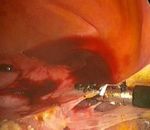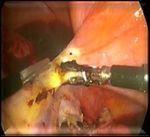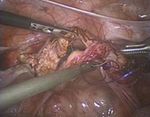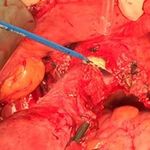Abdominal hysterectomy versus total laparoscopic hysterectomy in cases of enlarged uterine size
←
→
Page content transcription
If your browser does not render page correctly, please read the page content below
International Surgery Journal
Raslan MA et al. Int Surg J. 2022 Mar;9(3):524-529
http://www.ijsurgery.com pISSN 2349-3305 | eISSN 2349-2902
DOI: https://dx.doi.org/10.18203/2349-2902.isj20220362
Original Research Article
Abdominal hysterectomy versus total laparoscopic hysterectomy in
cases of enlarged uterine size
Mohamed Attia Raslan1*, Ahmed Tawfeek Morsi1, Hesham Mohamed Borg1,
Stefano Angioni2, Hesham A. El Aziz Salem1
1
Department Obstetrics and Gynecology, Faculty of Medicine, Tanta University, Tanta, Egypt
2
Department Obstetrics and Gynecology, Cagliari University, Cagliari, Italy
Received: 13 January 2022
Revised: 29 January 2022
Accepted: 31 January 2022
*Correspondence:
Dr. Mohamed Attia Raslan,
E-mail: raslangynecology@gmail.com
Copyright: © the author(s), publisher and licensee Medip Academy. This is an open-access article distributed under
the terms of the Creative Commons Attribution Non-Commercial License, which permits unrestricted non-commercial
use, distribution, and reproduction in any medium, provided the original work is properly cited.
ABSTRACT
Background: Total laparoscopic hysterectomy (TLH) is a feasible, efficient way to manage benign uterine pathology,
and is better than standard abdominal hysterectomy as it offers less postoperative discomfort, shorter hospitalization,
rapid recovery, and early return to daily living activities.
Methods: A retrospective comparative cohort study was done on patients with abnormal uterine bleeding due to large
myomas in the Department of Obstetrics and Gynecology, Tanta University Hospital, Tanta, Egypt, and Institute of
Obstetrics and Gynecology, Cagliari University, Cagliari, Italy. Participants were classified into two groups. Group I
(Laparoscopy group) included 20 patients for whom TLH was done. Group II (Laparotomy group) included 20
patients for whom open hysterectomy (OH) was done.
Results: Our result revealed that statistically significant differences were observed between the studied groups in
post-operative Hb value, postoperative return of bowel sounds, and amount of blood loss however, prolonged duration
of surgery was noticed in laparoscopic group than laparotomy group.
Conclusions: TLH is an accessible technique and an alternative to laparotomy when it was done by experienced
surgeons for large uteri regardless of the site, size.
Keywords: Large uterus, Multiple fibroids, Abdominal hysterectomy, TLH
INTRODUCTION laparoscopic ligation of the uterine vessels by
electrosurgery desiccation, suture ligature was first done
Several surgical approaches are wont to do a in 1988.3 Converting abdominal hysterectomy into a
hysterectomy. Abdominal hysterectomy was the laparoscopic procedure is the rationale for TLH to
commonest and invasive approach. Vaginal and minimize morbidity and trauma.4
laparoscopic hysterectomies are classified as minimally
invasive procedures.1 Most studies mentioned that the upper limit for uterine
size, usually 14 to 16 weeks’ gestation or weight more
Nowadays, TLH is a feasible, efficient way to manage than 500 grams as large uterine size.5 It was mentioned
benign uterine pathology, and is a best alternative to that Hugh uteri could be treated by laparotomy. Limited
standard abdominal hysterectomy as it offers less access to uterine pedicles depending on size and site of
postoperative discomfort, shorter hospitalization, rapid myomas, and high risk of complications such as
recovery, and early return to daily living activities. 2 haemorrhage are the main difficulties with Hugh uteri.
Laparoscopic hysterectomy (LH), defined as the Poor exposure, difficulty uterine extracting, and
International Surgery Journal | March 2022 | Vol 9 | Issue 3 Page 524Raslan MA et al. Int Surg J. 2022 Mar;9(3):524-529
prolonged procedure can lead to bowel and urinary tract laboratory investigations: complete blood picture,
injury.6 The aim of our study was to prove the feasibility coagulation profile, thyroid function test and liver
and safety of laparoscopic hysterectomy in cases of function test.
enlarged uterine size.
Methods of follow-up
METHODS
We estimated blood loss by calculating the blood volume
Consent to participate of the suction machine during surgery excluding liquid
used for intra-peritoneal washing and by weighing swabs.
An informed consent was obtained from each patient Operative time began at the first incision and finished
after the procedure was fully explained. after closure of the skin.
Study design Technique/procedure of TLH
This observational comparative cohort study was Step 1: Positioning and insertion of a uterine manipulator.
conducted on 40 patients. Patients were classified into Step 2: Abdominal entry and Trocar insertion: through 4
two groups: group I: (Laparoscopic group): LH was done punctures with trocars: 1 inserted either at the Palmer's
for them (20 patients). Group II: (Laparotomy group): point (a point 3 cm below the left costal margin in the
open hysterectomy was done for them (20 patients). midclavicular line) or supraumbilical 10-mm video port
and three lateral 5-mm ports. Patients were then placed
Settings in Trendelenburg position. Step 3: Round ligament
transection (Figure 1 A). Step 4: Removal or preservation
Patient selected from those attending the Department of of one or both ovaries: close to the ovary (hug the ovary)
Obstetrics and Gynecology, Tanta University Hospital, (Figure 1 B). Step 5: Mobilization of the bladder by
Tanta, Egypt, and Institute of Obstetrics and Gynecology, opening uterovesical fold of peritoneum from the round
Cagliari University, Cagliari, Italy from October 2017 to ligaments then dissection of the anterior leaf of the broad
October 2020. ligament continues anteriorly (Figure 1 C and D). Step 6:
The uterine vessels are ligation at the level of the internal
Eligibility criteria OS (Figure 2 A). Step 7: Colpotomy: created using
bipolar energy, ultrasonic energy, or a cold knife (Figure
The patients were selected according to the following 2 B). Step 8: The specimen is retrieved by Morcellation
inclusion criteria: patients complained from abnormal through the left upper quadrant 5-mm port, which is
uterine bleeding due to benign pathology with marked converted to 15-mm port. Using endo knife to cut
enlarged uterus. specimen into pieces to permit extraction the uterus
vaginally (Figure 2 C). Step 9: Vaginal cuff closure with
Patients were excluded according to following exclusion no. 0 delayed absorbable interrupted figure-of-8 sutures
criteria: 1) high anaesthesiology risk, 2) concurrent (Figure 2 D). Step 10: Port site closure with subcuticular
illness that does not permit using trendelenburg position, sutures using no. 3-0 delayed absorbable suture.
3) malignant causes and 4) systemic diseases.
Certain modifications are adopted as myomectomy prior
Full history to hysterectomy to create space for the procedure.
It includes-menstrual history, bleeding (onset, duration, Procedure of total abdominal hysterectomy (TAH)
rhythm, amount an-other sites of bleeding), systematic
diseases causing bleeding, previous treatment of Patient in a supine position, a transverse incision or a
abnormal uterine bleeding, previous gynaecological midline vertical abdominal incision was made.
surgery, and other comorbidities.
Step 1: Round ligament cutting. Step 2: Fallopian tube
Clinical examination and ovarian ligament or in fundibulo-pelvic ligament
clamping, cutting, and ligation (Figure 3 A). Step 3:
Clinical examination included-systemic examination, Bladder mobilization. Step 4: Uterine vessels and upper
abdominal examination, pelvic examination and bimanual part of cardinal ligament cutting (Figure 3 B). Procedures
pelvic examination. 2, 3, and 4 are also performed on the other side. Step 5:
Anterior vaginal wall incision and opening of the vaginal
cavity (Figure 3 C). Step 6: Bilateral USL clamping,
Investigations
cutting, and ligation. Step 7: Clamp, cut, and ligate the
USL and posterior half of the cardinal ligament. Step 8:
Imaging investigations
Vaginal vault closure and step 9: Abdominal wall
haemostasis and closure.
Transvaginal U/S. Computerized tomography (CT) or
magnetic resonance imaging (MRI): when needed,
International Surgery Journal | March 2022 | Vol 9 | Issue 3 Page 525Raslan MA et al. Int Surg J. 2022 Mar;9(3):524-529
A A
B B
C C
D D
Figure 1 (A-D): Total laparoscopic hysterectomy. Figure 2 (A-D): Total laparoscopic hysterectomy.
Round ligament transection; The anterior and Securing the uterine artery; colpotomy; the specimen
posterior leaves of the broad ligament were separated; is reduced by using endo knife and vaginal cuff
Hug the ovaries; mobilization of the bladder. closure.
International Surgery Journal | March 2022 | Vol 9 | Issue 3 Page 526Raslan MA et al. Int Surg J. 2022 Mar;9(3):524-529
Hb, return of bowel sounds, blood transfusion,
convalescence period, specimen weight, and blood loss.
Table 1: Statistical comparison between the two
studied groups as regards age, (n=20).
Age (years) Laparoscopy Laparotomy
Range 41-74 35-54
A Mean±SD 50.35±9.08 46.60±4.86
T test 2.652
P value 0.112
There was no statistically significant difference were
observed between the studied groups in mean age.
Table 2: Statistical comparison between the two
studied groups as regards body mass index, (n=20).
B
BMI (kg/m2) Laparoscopy Laparotomy
Range 22-36 24-40.5
Mean±SD 29.19±3.61 31.15±4.88
T test 2.095
P value 0.156
There was no statistically significant difference were
observed between the studied groups in BMI.
C Table 3: Statistical comparison between the two
studied groups as regards parity, (n=20).
Figure 3 (A-C): Abdominal hysterectomy. Ligation of Laparo- Laparo-
IPL; cut and ligation of uterine vessels and cardinal Parity scopy tomy X2 P value
ligament and colpotomy and uterine separation. N % N %
Normal 13 65 10 50
Statistical presentation and analysis of the present study 0.923 0.337
CS 7 35 10 50
was conducted, using the mean, standard deviation, and
chi-square test by SPSS V.17.
There was no statistically significant difference was
observed between the studied groups in parity. Seven
RESULTS
cases and ten cases whose were operated by laparoscopy
and laparotomy successively were delivered by CS. Six
Our study compared between laparoscopy and
cases from seven and only four cases from ten performed
laparotomy intraoperatively and postoperatively in cases
only one precious CS, however, one case from seven and
of huge uterine size including operative duration, postop
only three cases from ten performed two precious CS.
Table 4: The clinical (Intra-operative, post-operative) outcome of patients between the 2 groups, (n=20).
Laparoscopy group Laparotomy group
Parameters X2 P value
N % N %
Intraoperative outcome
Operative duration (min)
60-90 1 5 3 15
91-120 5 25 15 75
15.14 0.002
121-180 12 60 2 10
More than 180 2 10 0 0
Post-operative outcome
Post-operative Hb value (gm/dl)
6-8.4 0 0 4 20
8.5-10 2 10 13 65
23.01Raslan MA et al. Int Surg J. 2022 Mar;9(3):524-529
Laparoscopy group Laparotomy group
Parameters X2 P value
N % N %
Post-operative return of bowel sounds (days)
1st day 18 90 4 20
2nd day 2 10 15 75 19.85Raslan MA et al. Int Surg J. 2022 Mar;9(3):524-529
The clamp is used to secure a vascular pedicle in other REFERENCES
operative procedures such as salpingectomy, and
salpingo-oophorectomy. 1. Committee Opinion No 701: Choosing the Route of
Hysterectomy for Benign Disease. Obstet Gynecol.
Adequate laparoscopic training in a proper technique 2017;129(6):e155-9.
permits performing TLH in a successfully manner in 2. Sutasanasuang S. Laparoscopic hysterectomy versus
almost women with very enlarged uteri, with no increase total abdominal hysterectomy: a retrospective
in complication rates and short-term recovery. In skilled comparative study Comparative Study. J Med Assoc
hands, these patients could benefit all the advantages Thai. 2011;94(1):8-16.
related to minimally invasive approach such as minimal 3. Sinha R, Sundaram M, Lakhotia S, Mahajan C,
blood loss, short hospital stay, prompt recovery, Manaktala G, Shah P. Total Laparoscopic
obtaining a satisfactory result. From our data, there is no Hysterectomy for Large Uterus. J Gynecol Endosc
reason any longer to consider a contraindication to TLH Surg. 2009;1(1):34-9.
in bulky uterus; and in accordance with other studies, 4. Aarts JWM, Nieboer TE, Johnson N, Tavender E,
laparoscopy is a best alternative to laparotomy in all Garry R, Willem Mol JB, et al. Surgical approach to
cases irrespective of the size of the uterus especially if the hysterectomy for benign gynaecological disease.
operation will be done by expert surgeon.11 Cochrane Database Syst Rev.
2015;2015(8):CD003677.
The present study showed a complication rate was more 5. Kehde BH, Bruno J, Herendael V, Tas B, Jain D,
in the AH group instead of the LH group. Concerning Helsen K, et al. Large uterus: what is the limit for a
intra-operative complications: the speed of the laparoscopic approach? Autops Case Rep.
complication in TLH was seen in one case and TAH were 2016;6(1):51-6.
three cases. In TLH: one case with conversion to 6. Ceccaroni M, Roviglione G, Pesci A, Quintana S,
laparotomy, however, in TAH: one case with visceral Bruni F, Clarizia R. Total laparoscopic hysterectomy
(bladder) injury because of dense adhesions that of very enlarged uterus (3030 g): case report and
recognized intraoperative and the fringe of the wound review of the literature. Wideochir Inne Tech
was mobilized to assess the total extent of the injury and Maloinwazyjne. 2014;9(2):302-7.
bladder was repaired with a double layer closure with 7. Puntambekar SP, Wagh GN, Puntambekar SS, Sathe
small caliber absorbable suture further as methylthionine RM, Kulkarni MA, Kashyap MA, et al. A Novel
chloride test was done to confirm that the repair is Technique of Total Laparoscopic Hysterectomy for
adequate and two cases with intromission. Concerning Routine Use: Evaluation of 140 Cases Int J Biomed
postoperative events: the speed of the complication in Sci. 2008;4(1):38-43.
TLH was one case per twenty cases, however, the rate of 8. Kai-Yun W, Srithean L, Kuan-Gen H, Hsuan S,
the complications in TAH were six cases per twenty
Chih-Feng Y, Chyi-Long L. Laparoscopic
cases. In TLH: one case with vault dehiscence, however,
hysterectomies for large uteri Taiwanese. J Obstetr
In TAH: 2 cases with hemoglobin change, two cases with
Gynecol. 2011;50(4):411-4.
post-operative Fever, one case with bladder injury, and
9. Summitt RL Jr, Stovall TG, Steege JF, Lipscomb
one case with wound infection (p=0.001). Pyrexia was
GH. A multicentered randomized comparison of
seen in patients who underwent abdominal hysterectomy.
The 10% of those patients underwent abdominal laparoscopic assisted vaginal hysterectomy and
hysterectomy and. none of patients of LH had pyrexia. abdominal hysterectomy in abdominal hysterectomy
candidates. Obstet Gynaecol 1998;92:321-6.
No studies were excluded on language restrictions. 10. Okhunov Z, Yoon R, Lusch A, Spradling K, Suarez
Mainly prospective and retrospective studies were M, Kaler KS, et al. Evaluation and Comparison of
included. The results in these studies were all constant. Contemporary Energy-Based Surgical Vessel Sealing
This study was limited by the small sample size as such Devices. J Endourol. 2018;32(4):329-37.
the external validity of this analysis may vary by patient 11. Walid MS, Heaton RL. Total Laparoscopic
cohort and surgeon experience. Hysterectomy for Uteri Over One Kilogram JSLS.
2010;14(2):178-82.
CONCLUSIONS
TLH is an accessible technique and an alternative to
laparotomy when it was done by experienced surgeons
for large uteri regardless of the site, size. Cite this article as: Raslan MA, Morsi AT, Borg
HM, Angioni S, El Aziz Salem HA. Abdominal
Funding: No funding sources hysterectomy versus total laparoscopic hysterectomy
Conflict of interest: None declared in cases of enlarged uterine size. Int Surg J
Ethical approval: The study was approved by the 2022;9:524-9.
Institutional Ethics Committee
International Surgery Journal | March 2022 | Vol 9 | Issue 3 Page 529You can also read



























































